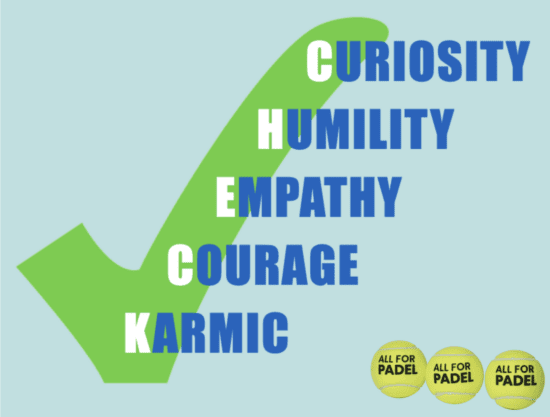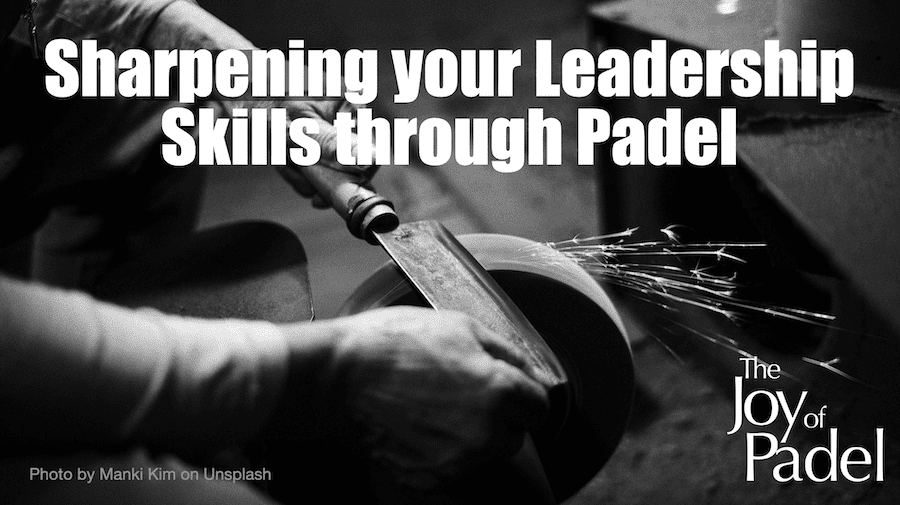In a recent article, I sought to explain how padel can be a great sport for building team spirit and enhancing communication and collaborative skills. [You can read that article here]. In this article, I want to dive into how padel is a fine way to exhibit the necessary mindset and attitude to lead in business today.
Enhancing Your Leadership skills
I firmly believe that padel tennis can at least shine a light on — if not enhance — your leadership skills. In You Lead, I laid out a leadership framework called CHECK which plays out well through padel too! See below why padel requires the same type of attitude as a modern leader.

- C for Curiosity. Padel is a sport in bloom. And the game is changing in terms of strokes, strategies and fortunes. You need to stay hungry to learn and stay up with the newest shots and techniques.
- H is for Humility. Padel requires a certain humility. Even the best players can be put in a situation where they can entirely miss the ball. With some of the quirky bounces off the side netting, no one is safe from making the silliest of errors.
- E for Empathy. Because your partner is half of your doubles team (think: your better half in a married couple), understanding the feelings and thoughts of your partner is absolutely key to getting your communication right and for managing your combined energies.
- The second C of the CHECK framework, is for Courage. Padel points last on average about 12 shots for the pros. Around 70% of shots are generally slower, with a higher margin of error (i.e. a little higher over the net and safely within the 10×10 surface on the opposite side before hitting the wall or side-netting). However, you can’t spend all your time dollying the ball back. You have to know when to go for it. This is when it takes courage. The expression often used in Spanish is valiente. There are times where you have to go for the big, and often riskier, shot. On the court, I might encourage my partner with a “con todo” (with everything) exhortation, which means that my partner has license to go for the gusto. And, by so doing, I understand that the risk is higher and that he has permission to screw it up, too. Without courage, applied at the right times, you are not likely to last long. Courage is what will help you stand out and stand up for something important.
- Now the K is a little less obvious. And I say it is deliciously so. It stands for Karma. What does this mean? It means being generous of spirit. For starters, if your partner screws up on the easiest of shots, remember you may do so next time. But more importantly, it’s key to keep in a positive spirit. At its core, it’s about giving before expecting in return. In this regard, I suggest it’s about showing the effort yourself before expecting the other to put in. You set the example. And, in the spirit of padel tennis, to the extent that it is, at its core, a social sport, if your opposition played a tremendous shot, be gracious and celebrate their shot under the umbrella of: it’s great for padel.
Earn the right…
One of the big temptations in padel is to go for the winners. But it’s a game of patience and strategy, requiring to know when is the smart time to strike. As I was taught by my cousin, who’s still ranked in the top 300 of the world, it’s better to be unhappy with the unforced errors than to be happy with the winners. To the extent that points are built and can last sometimes north of a minute, you need to know how to manage the to and fro, moving from defence to offence with frequency. If it’s a good rule of thumb to consider hitting 80% of your shots down the central portion of the court (ie. at one of the players at the net or in between them), there’s always a temptation to do a tricky shot. My coach, Alé, calls these “fantasy’ shots. But the key here is not to try the fantasy until you’ve earned the right. Just as there’s no point in doing a fake smash (think: dink) until you’ve established that you can hit a real smash, you shouldn’t go for the fantasy shots until you’ve set up that you have other “typical” shots. In business, just because you have a title doesn’t mean you deserve everyone’s respect. You have to earn it.
Split second decision-making prowess
Finally, padel requires players to make quick decisions under pressure, an essential quality for leaders. The nature of this sport encourages the development of strategic thinking, which is, of course, a key leadership attribute. By participating in padel, individuals can practice these skills in a fun and engaging setting. And, the best of it is that when you’re having fun, you don’t even know you’re learning and working. When you watch some of the best players, they sometimes draw on their instincts to hit unfathomable shots. They literally pull rabbits out of the hat. In this regard, I think there’s an element of intuition, combined with great skill and a measure of luck… just like in real life.
Healthy in body… healthy in mind
If that were not enough, padel can also aid in promoting a healthy and active lifestyle among employees, contributing to overall employee well-being. As my friend Atte (of Padel1969) has often said to me: If you’re feeling bad, play padel. “Life is too important to be taken seriously!” As I wrote in You Lead, the best leaders know how to lead themselves. This takes self-awareness and self-knowledge. The discipline and effort to keep your body in shape, to eat appropriately and well, and to have a certain lightness of being (à la Milan Kundera) all factor into the durability and success of a leader.
Are you interested in creating a Padel Team-Building Event?
If you are looking for someone to run a creative and innovative team-building exercise around padel tennis, please contact me or send a mail here. I run workshops on the court (90′) and then bring lessons learned from padel into business with an interactive and engaging 1/2-day seminar. If you’d like a 15-minute call to discuss my offer, please click here and book your most convenient slot:











